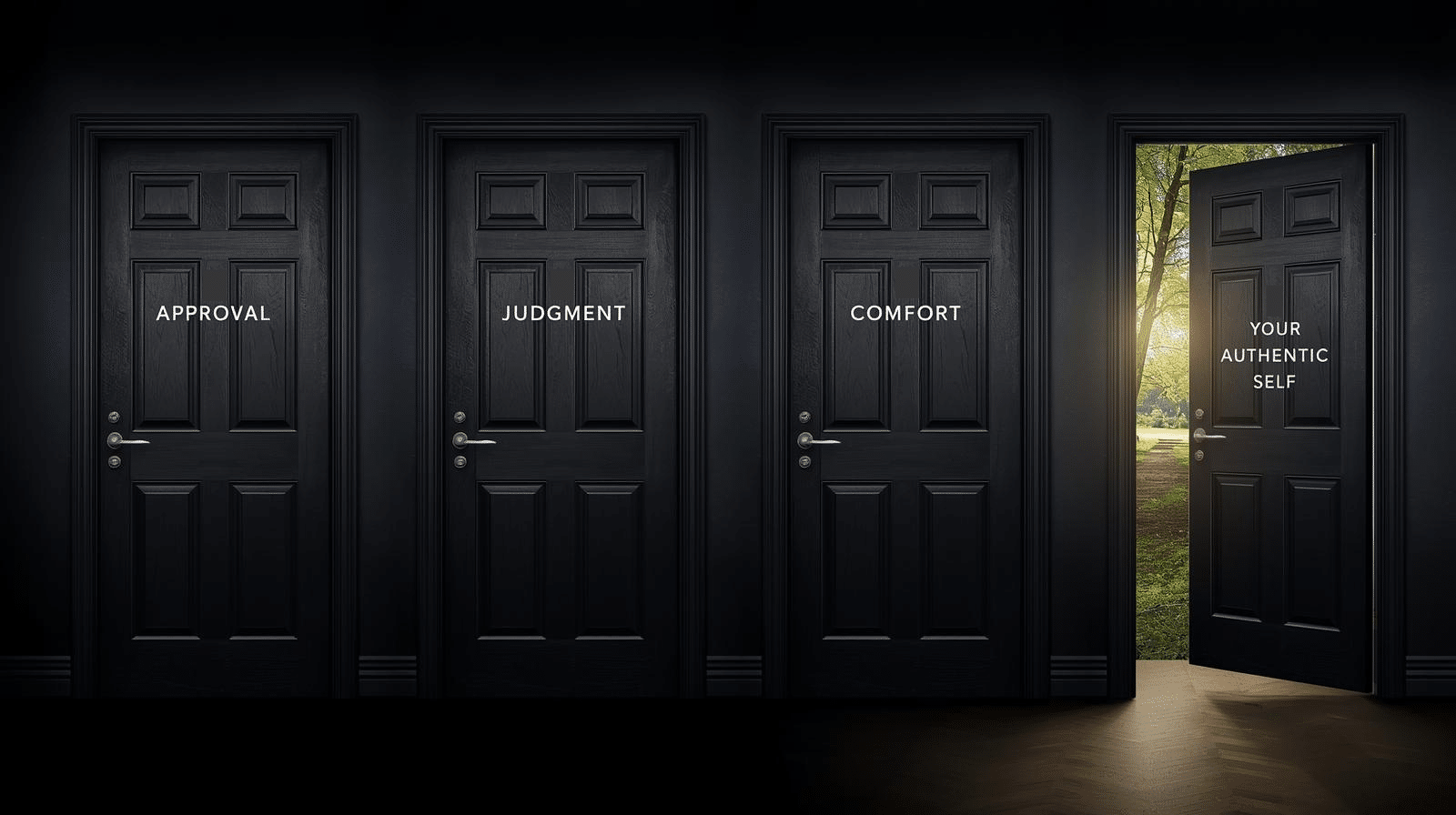Life feels perfect on paper. The career milestones achieved. The carefully constructed path followed. Yet something profound is missing – a disconnection from who you truly are beneath the layers of conditioning and expectations.
This gap between external success and internal fulfillment isn’t random. According to Albert Ellis, the pioneering psychologist who developed Rational Emotive Behavior Therapy (REBT), there are three specific irrational beliefs that keep us trapped in lives that look right but feel wrong:
“There are three musts that hold us back: I must do well. You must treat me well. And the world must be easy.”
These Three Major Musts, as they’re known in the REBT world, are the invisible weight we carry; limiting beliefs that pull us away from our authentic selves and hold us back from integrated, meaningful success. Let’s explore how each one shows up and how to recalibrate toward a more aligned way of being.
The First Must: The Need for Approval
“I must do well to be worthy.”
This is where our journey away from authenticity often begins. The need for approval drives us to perform rather than simply be. We become trapped in cycles of seeking external validation, convinced that our worth depends on meeting others’ expectations.
I know this Must well. For years, I spent thousands of dollars on designer handbags, clothes, and accessories – not because I loved them, but because I was trying to buy belonging. Growing up straddling two worlds – East Indian traditions at home and Western culture at school – I carried a deep fear of not fitting in anywhere. What I was really purchasing wasn’t fashion; it was an attempt to secure acceptance and avoid the pain of rejection.
This conditioning creates a vicious cycle. The fear of judgment and rejection leads us to perform constantly, seeking approval and love through achievement. We work excessive hours, chase perfectionism, and avoid risks; not because these behaviors serve our highest good, but because they feel safer than the vulnerability of showing up authentically.
The cost? We become strangers to ourselves, living lives built around others’ expectations rather than our own truth.
The Recalibration: Instead of “I must be accepted by others to be worthy,” we can choose: “I have inherent value for being myself, and I want connections with people who appreciate my authentic self.” True belonging comes from internal sources, from the courage to show up as who we really are.
The Second Must: The Need to Judge Others
“You must treat me well and meet my expectations.”
This Must is a protection mechanism disguised as superiority. When we’ve been hurt by opening ourselves up, it feels safer to make others prove their worth before we extend trust or acceptance. We hold people to impossible standards, positioning ourselves as judges of their competence and value.
Early in my corporate career, I fell into this pattern. Fresh out of college during a brutal job market, I was terrified of losing my position. My response? I held my teammates to unrealistic expectations, believing that if they failed, I would remain safe. I wasn’t mean, but I wasn’t helpful either. I had convinced myself that people must be competent and intelligent to have value. A false belief that protected my ego while damaging my connections with others.
This Must keeps us isolated and superior, but it also keeps us disconnected from the collaborative, supportive relationships that make work and life meaningful.
The Recalibration: Instead of “People must meet my expectations to be worthy,” we can choose: “All people, including myself, are imperfect, possess unique perspectives, and have inherent value.” From this place, we stop judging and start connecting – recognizing our shared humanity rather than policing others’ performance.
The Third Must: The Need for Comfort
“The world must be easy and without discomfort.”
This is perhaps the most seductive Must – the belief that life should be comfortable, convenient, and pleasant at all times. When we’re caught in this pattern, we avoid challenging situations, procrastinate on difficult decisions, and escape into “feel-good” behaviors that provide temporary relief but long-term stagnation.
I see this Must frequently in my coaching practice. Clients avoid difficult conversations or decisions, hoping problems will resolve themselves. They attach their happiness to external conditions, believing they should feel good all the time. When discomfort arises, which is inevitably does, they either blame themselves for being inadequate or blame the world for failing to provide the ease they believe they deserve.
This Must keeps us trapped in what society calls “living in la-la land” – disconnected from reality and unwilling to engage with the natural challenges that create growth and meaning.
The Recalibration: Instead of “Life must be easy and comfortable,” we can choose: “Life naturally ebbs and flows. Discomfort is not a sign that something is wrong. It’s often a signal that I’m growing. I am capable of solving problems and creating positive change.”
Breaking Free: From Conditioned to Conscious
These Three Musts aren’t character flaws. They’re adaptive strategies we developed to navigate a complex world. But what once protected us now limits us, keeping us trapped in patterns that prevent authentic expression and integrated success.
The path forward isn’t about perfection; it’s about awareness. When we recognize these Musts operating in our lives, we create space for choice. We can pause, examine the limiting belief underneath our discomfort, and consciously choose a response that aligns with our authentic self rather than our conditioned patterns.
This is the essence of recalibration – not changing who we are but closing the gap between the life that looks right and the life that feels deeply fulfilling.
The Path Home to Authenticity
The Three Musts – Approval, Judgment, and Comfort – are the invisible architects of our disconnection. They shape our choices, limit our possibilities, and keep us trapped in lives that serve others’ expectations rather than our own truth.
But here’s what I’ve learned through my own transformation (tears and all) and in guiding others through theirs: The gap between external success and internal fulfillment isn’t bridged by changing jobs, relationships, or locations. It’s closed by recognizing these limiting beliefs, understanding how they’ve shaped our story, and consciously choosing different responses.
Your authentic self isn’t something you need to create – it’s something you need to uncover. Beneath years of conditioning, beneath the “shoulds” and “musts,” your truth is waiting. The question isn’t whether you’re capable of this transformation; it’s whether you’re ready to begin the profound practice of coming home to yourself.
When you break free from these Three Musts, something profound shifts. You stop living in reaction to old programming and start responding from your center. The chronic tension between who you think you should be and who you actually are begins to dissolve.
This is where real success emerges – not from perfectly executing someone else’s blueprint, but from the radical act of honoring your own truth in how you work, love, and move through the world.
Ready to dive deeper into your recalibration journey? Discover more transformative insights on my Medium page and YouTube channel. For ongoing inspiration, catch the latest Disrupting Default podcast episodes on Spotify or Apple Podcasts, or visit the show’s website for additional resources.








